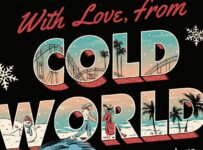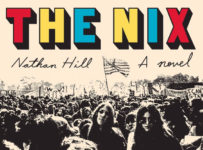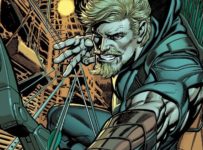
John Dies At The End is not a novel, but a monster stitched together piecemeal from the detritus of David Wong's mind over the course of several years. That it never delivers on the promise made by its title would probably not matter to the many readers unable to sustain patiences enough to stick it through to the bitter, bitter end. I stayed around, and let me say that it was so ridiculously not worth it that I practically embraced my Sookie Stackhouse chaser. John Dies At The End transmutes pulpy vampire novels into high art through sheer proximity; take Wong's work and you can make anything entertaining by comparison. It's a kind of magic, or alchemy at the very least.
There are several kind of misanthropies in this world: there is the kind that hates fun and the idea of anyone else having fun and must stop it at all costs (like me, telling you that this book is awful – I see this as more pragmatism than misanthropy); more sinister is the type of misanthropy embodied by Wong, which is based on the exploitation of humanity by utilising contempt for them to wring money from their all too willing wallets (this brand is also known as "capitalismâ€). While John Dies At The End was written by a man trying to kill the boredom of his low paying jobs, Wong has commuted that sentence to a presumably lucrative career as the editor of Cracked dot com, consistently one of the worst sites on the internet.
David Wong is a high school drop out who accidentally imbibed a drug called soy sauce and consequently sees things that are there and has to banish them to other realms. He tells the stories of his soy sauce fuelled rampages to sceptical reporter Arnie Blondestone, from the time he went to Vegas with his homophobic friends to the time that he went to a haunted mall with a homophobic friend, to the time that he crossed dimensions with a homophobic friend.
First of all, I am going to note that David Wong is actually a pseudonym for Jason Pargin, potentially the whitest man on Earth (he is, after all, the editor of Cracked dot com). When he wrote this, it is conceivable that he was using a pseudonym to avoid linking the writing to his day and night jobs; now that he has met success, he is still David Wong. The character deflects the pseudonym but I do not see any reason for Pargin to pass himself off as Wong. For the purposes of this review I will continue to refer to him as Wong, but I still think that it's a dick move on his part.
The fact that John Dies At The End was made up as Wong went along does not justify its complete lack of narrative cohesion across multiple publications and publishers. At some point, Wong could have looked at his work and said "you know what? This part here directly contradicts that part there. Nerds care about continuity,†but he didn't, and we're left with a book wherein a girl described as mentally subnormal when we first meet her eventually becomes a smart girl with an amputated hand that David somehow never noticed up to that point.
What concerns me most about this book, apart from everything, is the reaction that a lot of people have had to it: they find it legitimately scary, to the point of inducing nightmares. Fear is one of the more objective emotions, of course, and I can't strictly critice someone for feeling it, but still: seriously? Wig monsters with baby hands and scorpion tales. Exploding dogs. Popular songs altered by ethereal beings to feature racist and anti-semitic lyrics. White things that burrow into human flesh with an ambiguous viral application. Not exactly pleasant things to read about, but nothing that is too uncannily familiar, nothing too particularly haunting.
I don't think that it's abnormal for me to have had this particular reaction; I came into this expecting a comedy adventure awash with not-scary horror tropes and I felt that this was exactly what Wong has attempted, even if it doesn't meet most of my criteria for a satisfactory novel. Regardless of what anyone thinks of the quality of John Dies At The End, the idea of being afraid of it is anathema to me; Wong is very deliberately playing this for laughs. The fact that most of them don't register as funny is irrelevant.
As much as I loathe this book, it's definitely not without its moments. The second story, about the discovery of soy sauce, is actually relatively well constructed and is the most pure piece of storytelling found in the book. That's not saying much, but Wong's attention span is admirable for this segment and his ideas are somewhat compelling. Small set pieces like the accidental sabotage of an ammunition production line and the erase of collective memory stick out and belong in a more competently composed novel. If soy sauce's purpose and utility had stayed consistent throughout the rest of the book, things might have gone differently; its existence and its application are so different between stories that Wong may as well have been writing about a different substance.
The book's Korrok section features a couple of striking segments dealing largely with possessed people, computers and animals claiming "I serve none but Korrokâ€, but this is where the whole project falls irrevocably to pieces. There is some sort of vague conspiracy between worlds, but it's barely more than sketched out and the entire "Shit Narnia†sequence is painful to read. Some of the character developments that surround the events of "Shit Narnia†are well-realised, if out of place, and the resolution of the journalist's storyline is surprisingly satisfactory for such an ultimately wasted and overly obvious framing device.
Still, even on the occasions that the story is functional, the characters remain largely horrible. John and Dave are literally too cool for school, a pair of slackers content with achieving nothing but substance abuse and embedding pop culture non-sequiturs in their dialogue – like a brief mention of Joanie Loves Chachi in the midst of a discussion about the murder of a weatherman. John is supposed to be the worse character of the two, but there is little to recommend Dave apart from the fact that he is marginally better at holding down a job; he starts one section with "I would like to pause for a moment, to talk about my penis.†We launch into ten paragraphs of pointless meditation on the character's genitals simply to justify the fact that Dave has gone to work. Not exactly character building, and one couldn't be blamed for thinking that Dave isn't wasting Arnie Blondestone's time alone.
Dave has a mysterious and heavy past, but it's another one of those mysteries not worth the solving. I get the impression that Wong simply established it as a mystery at the start because he didn't have anything good enough to go on; he should have kept it that way, because Dave becomes less and less sympathetic the more he goes on, and his relation to women only slightly improves. By novel's end, everyone is still as homophobic, phallically obsessed and occasionally derivative of Ghostbusters as they ever were. An argument could be made that John and Dave are accurate embodiments of the 21st century slacker (written by a man still firmly engulfed in the 20th century notion of the slacker) – but even if that's the case, I still don't want to know them or anyone like them.
Probably the best thing about John Dies At The End is that it has been made into a movie by Don Coscarelli, of Bubba Ho-Tep fame. Key passages of this book read as if they could make a good film in the right hands, and I believe Coscarelli could work something out of this; John Dies At The End isn't a literary tone piece, and the translation to a quick and dirty horror comedy romp (with a cohesive story) could restore a certain gravitas to the work that it doesn't strictly deserve. (This paragraph was written before I got a tweet from the account purporting to belong to the actor who plays Dave, which said "you have no taste and you tweet too muchâ€. My enthusiasm for the project has waned somewhat since then – especially seeing as two of the alleged Chase Williamson's five tweets to date are dedicated to giving me ice burns – but I'll probably see it anyway if it ever gets released.)
When something develops a cult following, as John Dies at the End obviously has in the years since its inception, it's hard to gauge its actual success and cultural impact. There are a lot of people who feel very strongly for it but there are undoubtedly countless others who have never heard of it. I'm in the strange position of feeling like I'm coming down hard on both a much loved literary property and an obscure shanty town of a genre novel. Hopefully the contempt I draw from whatever fans find this review will be tempered by the lack of a response from anyone else.
The thing is that somewhere down the line, John Dies At The End transitioned from being a hobby to being a product. You can ask and receive less from a hobby than a product, because Wong never expected you to pay for his work as he was writing it. Then he found a publisher, and the audience's expectations had to change in line with the transformation of the work into something saleable – but the expectations of me, the ostensibly paying customer (I got this book from the library), were never reasonably met by a product substantially the same as a hobby horse with less typos.
John Dies At The End is essentially worse than any of the eldritch horrors described both vaguely and graphically within its pages, and I wish I could slay it. Alas, Wong's status as an internet darling forbids this, and by next week I will be found dead in a ditch for having spoken out against him, all traces of me erased from history. But the truth must out, people! Avenge me!



I had a lot more fun with the novel than you did, but I totally agree that there’s nothing really holding the novel together. It’s a disjointed series of sometimes conflicting short stories centered around a weird drug and comedy/horror tropes. Some of them work out better than others, but ultimately nothing connects them.
I’m hoping Coscarelli managed to wrangle a cohesive narrative out of this, but on the other hand, we’re talking about the guy who made Phantasm. Back on that first hand, though, Coscarelli seems to be able to make that sorta disjointed feeling work (at least, it worked in Phantasm). I don’t know what that dork on twitter was thinking though. Half makes me not want to see the movie (but I probably will because of Coscarelli).
I, on the other hand, had less fun than you did.
We’re all writers. That’s why we blog. There have been times when I have written stream-of-consciousness nonsense that was only clever for the immediate thirty-seconds after I wrote it. And then I realized just how bad it was and either A: put in my drawer of writing that I’m embarrassed about or, more likely, B: threw it out.
David Wong decided to publish his. *shrug*
I was actually tempted to go back and re-read this, thinking that I had been to harsh. Your review just reinforced my feelings about it. I guess it’s back to the Dune prequels. *shudder*